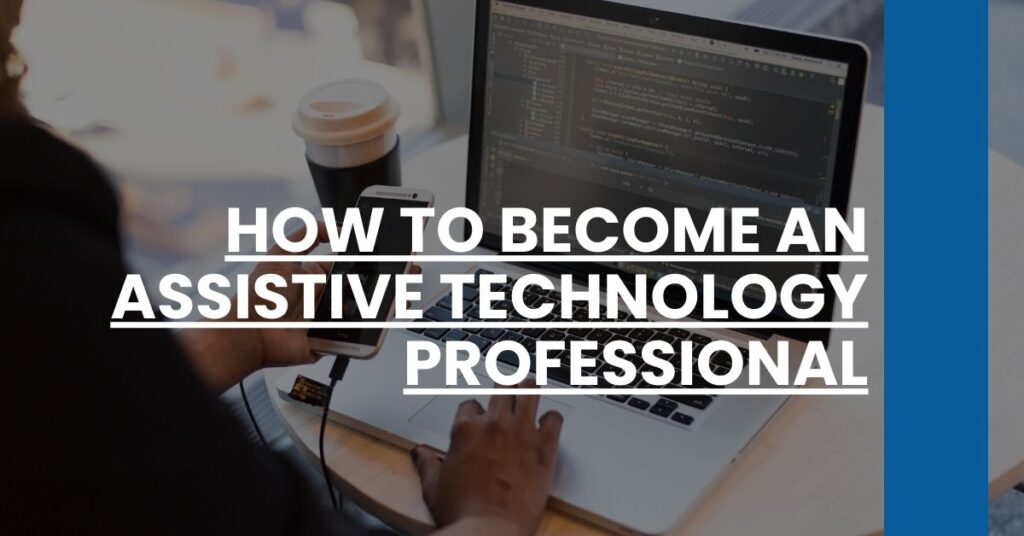How to become an assistive technology professional: Begin your path with precision and purpose.
- Education Pathways for Assistive Technology Professionals: Pursue relevant degrees and specialized training programs.
- Assistive Technology Certifications: Obtain key certifications to validate your expertise and skills.
- Gaining Experience in Assistive Technology: Engage in hands-on experience through internships and related job roles.
Embark on a meaningful career by learning how to become an assistive technology professional.
- Understanding the Role of an Assistive Technology Professional
- Educational Requirements and Pathways
- Certifications and Specializations
- Gaining Relevant Experience
- Networking and Professional Development
- Navigating the Job Market
- Legal and Ethical Considerations
- Keeping Up with Technological Advancements
- The Impact of Professional Expertise
- Conclusion
Understanding the Role of an Assistive Technology Professional
An Assistive Technology (AT) Professional represents a beacon of hope and empowerment in the lives of individuals with disabilities. Their role encompasses far more than just providing gadgets; it’s about equalizing opportunities, enhancing independence, and fostering inclusion in education, employment, and day-to-day life.
What Does an Assistive Technology Professional Do?
As an AT Professional, your mission is to assess the needs of individuals with diverse abilities and identify the most appropriate technological solutions to address those needs. This could range from simple communication devices to complex environmental control systems.
- Individualized Assessments: Conduct evaluations to understand the specific needs and abilities of each client.
- Solution Customization: Recommend and customize AT devices or systems tailored to each individual’s requirements.
- Training and Support: Provide education and ongoing support to users and caretakers to effectively integrate technology into their lives.
- Collaboration: Work in multidisciplinary teams, including healthcare providers, educators, and employers, to orchestrate holistic support.
With the right AT, individuals with disabilities can perform tasks that were once challenging or impossible, gaining agency over their environment and interactions with the world around them.
Why is this role essential?
Your work as an AT professional breaks down barriers. Not only do you enable communication and mobility, but you also fight stereotypes by showcasing the capabilities of individuals with disabilities. The end goal is not just to equip people with tools, but to provide the means to lead vibrant and fulfilling lives.
Educational Requirements and Pathways
While there is no one-size-fits-all approach to becoming an assistive technology professional, there are certain educational pathways you can take to ensure you are well-prepared for this gratifying career.
Degrees and Programs
A strong foundation is essential in this dynamic field. The following degrees are common among successful AT professionals:
- Bachelor’s degree in education, special education, occupational therapy, or a related field.
- Master’s degree focussing on rehabilitation science or assistive technology, though not a strict requirement, could give you a notable edge.
Alongside mainstream educational pathways, various specialized training programs can propel you toward becoming an assistive technology professional. For example, the excellent Assistive Technology and Accessible Educational Materials Center provides guidelines on embracing inclusive technologies within education—ideal for those interested in working within the school system.
Specialized Courses and Workshops
Embarking on secondary courses and workshops is an ideal way to deepen your knowledge. Topics range from disability law to technical courses on the latest AT devices. Stay curious, and seek out opportunities for growth to remain at the forefront of this fast-evolving field.
Certifications and Specializations
To demonstrate commitment and expertise, professional certification can serve as a significant milestone in your career as an assistive technology professional.
Pursuing Certification
The RESNA Assistive Technology Professional (ATP) certification is globally recognized as the standard for professionalism in AT. To obtain your ATP certification, which proves your capability in analyzing needs, selecting appropriate devices, and providing training to users, visit the comprehensive RESNA website for detailed instructions and resources.
Curriculum enhancements, such as the Assistive Technology Certificate offered by the University of Illinois at Chicago, affirm the successful completion of a specialized training program and witness a 100% pass rate for the ATP certification.
Advancing with Specializations
The field of AT is vast, covering areas such as communication, mobility, environmental control, and computer access. Specializing in one or more areas can not only make you highly sought after but will also allow you to profoundly impact specific populations or industries through your in-depth expertise.
Gaining Relevant Experience
With the theory under your belt, hands-on experience will bring your knowledge to life. There are abundant opportunities to immerse yourself in the world of assistive technology, gaining the invaluable practical experience necessary to become a proficient AT professional.
Internships and Volunteer Positions
Engaging in internships or volunteering with companies, hospitals, or nonprofit organizations dedicated to assistive technology is a powerful way to build real-world skills. Opportunities like undergraduate research experiences can offer mentorship and insight into the cutting-edge of AT research.
Leveraging Entry-Level Work
Entry-level positions in organizations that provide AT services not only provide a paycheck, but also act as an essential stepping stone to higher levels of responsibility and expertise.
Building a Portfolio
Create a portfolio that showcases your successful AT interventions. This real-world evidence of your impact can distinguish you from other candidates when seeking advancement or specialized roles.
Networking and Professional Development
Like most professions, success in the assistive technology sector is not solely determined by knowledge and practical skills. The connections you forge and the continuing education you pursue are invaluable for career growth.
Networking Opportunities
Connecting with like-minded professionals can offer immense benefits. Below are key networking avenues:
- Professional Organizations: Join associations such as the Assistive Technology Industry Association (ATIA), which connect you with industry veterans and newcomers alike.
- Conferences and Symposiums: Events like the ATIA Conference provide an environment to learn about advancements, meet industry leaders, and engage with cutting-edge AT vendors.
- Online Communities: Engage in online forums and LinkedIn groups related to assistive technology, where you can share knowledge and learn from others’ experiences.
Embracing Lifelong Learning
In the field of assistive technology, stagnation is not an option. Commit to lifelong learning through:
- Continuing Education: Pursue additional certifications and attend workshops to stay updated on new technologies and methods.
- Literature and Research: Regularly read scholarly articles and industry publications to keep abreast of the latest research and trends.
By continuously expanding your network and skill set, you enhance your capability to improve the lives of those you aim to serve.
Navigating the Job Market
Securing a position as an assistive technology professional requires strategy and focus. Your prospective employers are diverse, ranging from educational institutions and healthcare facilities to tech startups. The key is to position yourself as a valuable asset within these industries.
Identifying Job Opportunities
- Research Organizations: Identify organizations and companies where assistive technology professionals are in demand, such as schools, rehabilitation centers, and assistive technology manufacturers.
- Utilize Job Boards: Regularly scan job boards that are dedicated to assistive technology or have sections related to healthcare, education, or disability services.
- Company Websites: Don’t forget to check the careers page on company websites you admire. Sometimes, the best opportunities are not widely advertised.
Perfecting Your Application
- Tailor Your Resume: Highlight relevant education, experience, and certifications. Illustrate your understanding of assistive technology through concrete examples of how you’ve used it to help others.
- Craft a Compelling Cover Letter: Convey your passion for assistive technology and its impact on inclusion and accessibility. Connect your skills and experiences to the job description, demonstrating why you’re the ideal fit.
Mastering the Interview Process
- Showcase Your Expertise: Be prepared to discuss your experience with specific types of assistive technology and relevant outcomes you’ve helped achieve.
- Ask Probing Questions: Show your engagement by asking insightful questions about their AT programs and the populations they serve.
- Demonstrate Continuous Learning: Discuss how you stay up-to-date with the latest in assistive technology, as this will signal your commitment to ongoing professional development.
Legal and Ethical Considerations
Navigating the legal landscape and adhering to ethical standards is crucial for assistive technology professionals. Your role carries the responsibility of not just implementing technology but also of safeguarding the rights and dignity of individuals with disabilities.
Understanding Legal Frameworks
Familiarize yourself with legislations such as the Americans with Disabilities Act (ADA), Individuals with Disabilities Education Act (IDEA), and Rehabilitation Act. These laws are designed to protect the rights and ensure equal opportunities for individuals with disabilities, and you will be at the forefront of applying these principles in practice.
Adhering to Ethical Standards
An awareness of the ethical implications of your work will inform every decision you make. This includes maintaining client confidentiality, recommending only necessary and cost-effective assistive technologies, and respecting the autonomy of your clients in their technology choices.
Keeping Up with Technological Advancements
Staying current with ever-evolving assistive technology is not just beneficial; it’s essential. By being well-informed, you ensure that you are providing the best possible solutions to meet the needs of individuals with disabilities.
Embrace Continuous Innovation
Engage with Emerging Technologies: Understand and test new innovations like voice-activated assistants or wearable devices to evaluate their practical applications.
Participate in Professional Development
Seek out training opportunities and certifications that delve into new developments in assistive technology. Being proactive in your education allows you to anticipate shifts in the industry and adjust your practice accordingly.
The Impact of Professional Expertise
Becoming an assistive technology professional is more than a career choice; it’s a commitment to enhancing lives through technology. Your expertise can open doors that were previously closed and bridge gaps that seemed insurmountable.
Transforming Lives
Your role is pivotal in creating pathways to education, work, and social participation for individuals with disabilities. By matching the right technology with the right individual, you create personalized solutions that encourage independence and self-reliance.
Advancing Inclusivity
An assistive technology professional is inherently an advocate for inclusivity. Your work contributes to building a world where disability does not equate to disadvantage, and every individual has the opportunity to reach their fullest potential.
Conclusion
Now that you are familiar with how to become an assistive technology professional, it’s time to take the next steps. Begin with education and certification, then build a solid foundation of experience. Cultivate connections within the community and commit to lifelong learning to keep abreast of technological progress. Your journey will not just be about personal achievement but also about the immeasurable impact you’ll have in the lives of others. Your expertise, compassion, and dedication will contribute to a more accessible and equitable world. So, venture forth with resolve and anticipation for the remarkable career that awaits you.

